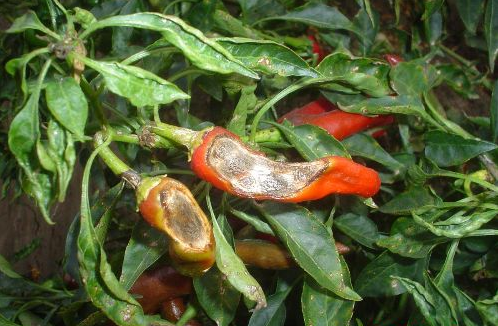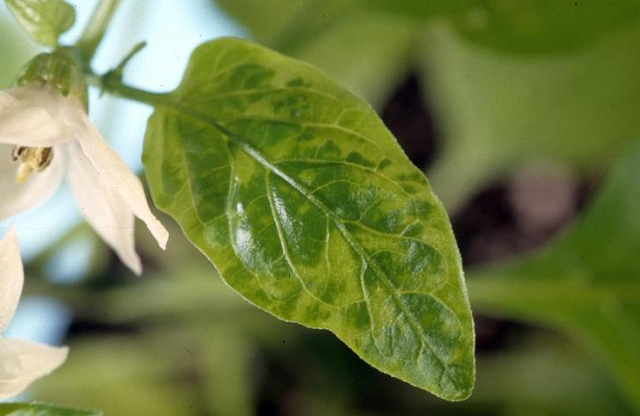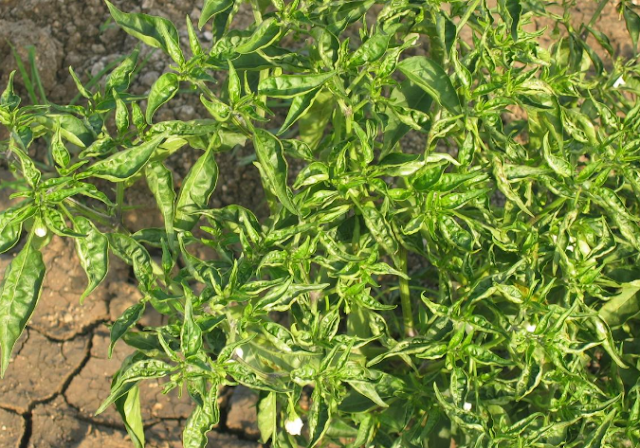Diseases of chilli and their management
Anthracnose/Fruit Rot/Die-back of Chilli
Causal organism: Colletotrichum capsici.
Symptoms
The disease occur in two forms; Dieback and Ripe fruit rot.
Dieback
1. The disease causes necrosis of tender twigs from the tip to backward. The entire branch or the entire top of the plant may wither away.
2. Numerous black dots (acervuli of fungus) are found scattered all over the necrotic surface of the affected twigs.
3. Only the top or few side branches may be killed or in severe attacks the entire plant is withered. Partially affected plants bear fruit which are few and low quality.
Ripe fruit rot
1. Although red ripe fruits are frequently affected, anthracnose symptoms appear even on well developed green fruits.
2. Small black circular spots are appeared on the skin of the fruit and spread along the long axis of the fruit and thus becoming more or less elliptical.
3. The spots are usually sunken with black margin. Badly diseased fruit turn straw colour from normal color. Sunken spots are covered with pinkish mass of fungal spores.
4. The fruits with many spots drop off prematurely, resulting heavy loss in yield. Seeds are also infected by this fungus.
 |
| Symptoms of Anthracnose/Fruit Rot/Die-back of Chilli |
Favourable condition
▲ High temperature (28 C).
▲ High relative humidity (92% or above).
▲ Heavy and prolong dew deposition after rainy season.
Management/Control Measure
A. Cultural control
♦ Seeds should be collected from spotless fruits.
♦ Disease crop debris should be collected and burnt.
B. Chemical control
♦ Seed treatment with Vitavax200, Brassical @ 2g/ kg of seed.
♦ Spraying with DithaneM 45 or Bavistin @ 0.2% solution, 34 times after 15 days interval when fruit begin to ripe.
Mosaic of Chilli
Causal organism: Tobacco mosaic virus.
Vector: Aphid (Aphis gossypii).
Symptoms
1. The most characteristics symptom appearance of dark green and light green areas on the leaf surface.
2. Leaves are greatly in size and filamentous like.
3. The diseased plant produces less flower and fruits. The fruits are usually deformed and rough in texture.
 |
| Symptoms of Mosaic of Chilli |
Transmission
The virus is sap transmissible. It is also transmitted by aphid.
Management/Control Measure
♦ Field sanitation.
♦ Roughing and cultural practices.
♦ Use of optimum doses of nitrogenous fertilizer in the field.
♦ Destruction of lateral alternate host.
♦ Spraying with Malathion/Metasistox/Diazinon/Sumithion @ 0.1% solution at 10 days interval, starting from early stage of plant growth and stopped at least 20 days before plucking of fruits.
Leaf Curl disease of Chilli
Causal organism: Leaf curl virus.
Vector: White fly (Bamici tabaci).
Symptoms
1. The leaf curl is characterized by severe stunting of the plants with downward rolling and wrinkling of leaves.
2. Leaves become small in size; internodes are shortened, giving the plant as witches broom appearance.
3. Leaves are pale yellow coloured.
4. Fruiting is stopped or fruits that formed are small and deformed. Alternate Hosts Tobacco, Tomato, Papaya etc.
 |
|
Symptoms of Leaf Curl disease of Chilli
|
Transmission
The virus is not sap transmissible or not seed borne. It is transmitted by white fly.
Management/Control Measure
♦ Field sanitation.
♦ Roughing and cultural practices.
♦ Use of optimum doses of nitrogenous fertilizer in the field.
♦ Destruction of lateral alternate host.
♦ Apply Carbofuran 3G @ 4-5 Kg/acre in the mainfield to control sucking complex and insect vectors selectively.
♦ If it is not possible spray the crop with systemic insecticides. Dimethoate 2 ml or Acephate 1g per litre of water.
♦ Collect and destroy infected virus plants as soon as they are noticed.
This is all about Diseases of chilli and their management. I think this discussion will help us to know the symptoms of chilli diseases and their management at the right time. Before going to management we should carefully identify the exact disease. Without proper identification, we can’t get the best result of management.
Happy reading!